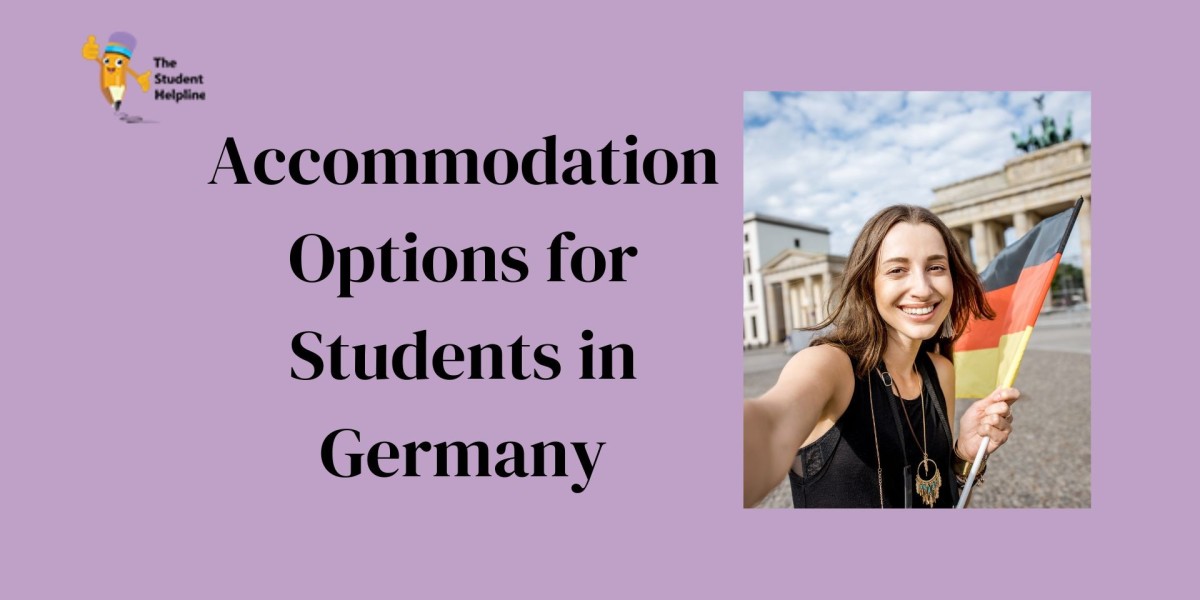Finding suitable accommodation is one of the most important steps when planning to study abroad. For those intending to study in Germany, understanding the types of student housing, their costs, and how to secure them can significantly enhance your experience. If you’re feeling unsure about the process, reaching out to study in Germany consultants near me can simplify your housing search and ensure a smooth transition.
1. Types of Accommodation for Students in Germany
Germany offers a variety of housing options for international students, catering to different budgets and preferences. Below are the main types of accommodation:
a) Student Residences (Dormitories)
Overview: Managed by Studentenwerk (student services organizations), dormitories are among the most affordable and popular options for students.
Cost: €200–€400 per month, depending on the location and facilities.
Features: Shared kitchens and bathrooms, basic furniture, and utilities included.
Demand: High demand, so apply as early as possible, especially in cities like Munich, Berlin, and Hamburg.
b) Private Shared Apartments (Wohngemeinschaft or WG)
Overview: A common choice among students, shared apartments involve renting a room in a flat with other tenants.
Cost: €300–€700 per month, depending on the city and apartment size.
Features: Shared living spaces (kitchen, bathroom), often fully furnished.
Advantages: A great way to save money and meet new people.
c) Private Apartments
Overview: Renting a private apartment is ideal for students who value privacy and independence.
Cost: €500–€1,000 per month, depending on the location and size.
Features: Fully furnished or unfurnished options, utility costs are typically separate.
Drawbacks: Higher costs compared to shared housing.
d) Hostels and Temporary Accommodation
Overview: Suitable for short-term stays while searching for permanent housing.
Cost: €50–€100 per night.
Options: Youth hostels, budget hotels, or Airbnb rentals.
e) Homestays
Overview: Living with a local German family, offering a cultural immersion experience.
Cost: €300–€500 per month.
Advantages: Practice German language skills and experience German culture firsthand.
2. Costs of Student Accommodation in Germany
The cost of accommodation varies based on location, type, and amenities. Below is a general breakdown of monthly housing expenses:
Small Cities: €200–€400.
Medium-Sized Cities: €300–€600.
Major Cities (Berlin, Munich, Frankfurt): €400–€1,000.
Additionally, utility costs (electricity, water, internet) may range from €50 to €100 per month for private rentals. Shared housing options often include utilities in the rent.
3. How to Find Accommodation in Germany
a) University Housing Services
Most universities collaborate with Studentenwerk to provide student dormitories.
Visit your university’s website or contact their international office for assistance.
b) Online Portals and Platforms
Popular Websites:
WG-Gesucht: For shared apartments and private rooms.
ImmobilienScout24: For private rentals.
HousingAnywhere: Specialized for international students.
Studentenwerk Websites: For dormitory applications.
c) Social Media Groups and Forums
Join Facebook groups or forums specifically for international students in your city.
Connect with other students who might be looking for roommates or offering rooms.
d) Study Abroad Consultants
A reliable study in Germany consultant near me can help you find accommodation tailored to your budget and preferences.
Consultants often have partnerships with housing providers and can expedite the process.
e) Local Bulletin Boards
Check notice boards at your university, libraries, or community centers for housing listings.
4. Application Process for Student Housing
a) For Student Residences
Apply Early: Start your application as soon as you receive your university admission letter.
Documents Needed: Admission letter, proof of identity, and sometimes financial proof.
Waitlist: Be prepared to be on a waitlist as demand is high.
b) For Private Rentals
Prepare a Rental Application: Include proof of income (or blocked account), university admission letter, and ID/passport.
Sign a Rental Contract: Ensure you understand the terms, including deposit amount and notice period.
Deposit: Typically two to three months' rent, refunded when you move out if no damages occur.
5. Tips for Securing Affordable Accommodation
Start Early: Begin your search as soon as you accept a university offer.
Be Flexible: Consider living in the suburbs or smaller towns near major cities to save on rent.
Connect with Local Students: They often have insights into affordable housing options.
Use a Consultant: A study abroad consultant can simplify the process and help you avoid common pitfalls.
Avoid Scams: Be cautious when transferring money. Always visit the property or verify the landlord’s legitimacy before making payments.
6. Cultural and Practical Insights About Student Housing in Germany
a) Shared Living (WG Culture)
Shared apartments (WGs) are a cultural norm in Germany, fostering a sense of community.
Expect shared responsibilities like cleaning communal spaces.
b) Furniture
Some apartments, especially private rentals, may not include furniture. Budget for essential items if needed.
c) Noise Regulations
Germany has strict noise regulations, especially after 10 PM. Be mindful of your neighbors.
d) Registering Your Address (Anmeldung)
Upon moving in, register your address at the local citizens' office (Bürgeramt). This is mandatory and required for opening a bank account and other formalities.
7. Common Challenges and Solutions
a) High Demand in Major Cities
Challenge: Finding affordable housing in cities like Munich and Berlin can be tough.
Solution: Apply for student dorms early or consider nearby towns.
b) Language Barriers
Challenge: Many housing advertisements are in German.
Solution: Use translation tools or seek help from a study abroad consultant.
c) Limited Availability
Challenge: Limited spots in dormitories.
Solution: Explore shared apartments or private rentals as backup options.
8. Role of Study Abroad Consultants
Working with a study in Germany consultant near me can simplify the accommodation search. Here’s how they can help:
Personalized Support: Tailored advice based on your preferences and budget.
Access to Resources: Partnerships with housing providers for quicker solutions.
Language Assistance: Help with navigating German-language housing platforms.
Legal Guidance: Ensure your rental contract complies with local laws.
Post-Arrival Assistance: Support with registration and settling into your new home.
9. Conclusion
Securing the right accommodation is a critical part of planning your study abroad journey. Whether you choose student dormitories, shared apartments, or private rentals, starting early and being proactive can make all the difference. For tailored support, consider consulting a study in Germany consultant near me, who can guide you through the process and help you focus on your studies while enjoying your experience abroad.



